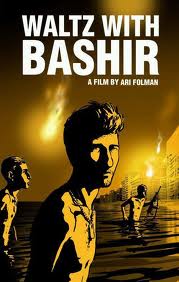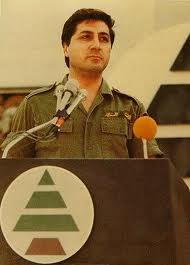 Watching this movie together with Beaufort, a 2007 Israeli film, may help us understand the complicated state of affairs of the Lebanon War. Waltz with Bashir depicts the beginning of the Lebanon War while Beaufort depicts the final withdrawal of Israel from Lebanon in 2000.
Watching this movie together with Beaufort, a 2007 Israeli film, may help us understand the complicated state of affairs of the Lebanon War. Waltz with Bashir depicts the beginning of the Lebanon War while Beaufort depicts the final withdrawal of Israel from Lebanon in 2000.
In 1982, the Israeli army invaded their neighbor Lebanon. Because large-scale Palestine refugee camps in Lebanon became hiding places for anti-Israel terrorists, the strategic intention was to eradicate these terrorists. In addition, Israel intended to establish a pro-Israeli regime in Lebanon by supporting Bashir, the charismatic leader of the Christian Phalange party; at the time, the Phalange party and an Islamic group that was supported by Syria were competing for power in Lebanon. However, even though Bashir was elected in the Lebanon presidential election, he was assassinated immediately after.  The Phalange party assumed this assassination to be an act by Palestinian guerillas so they carried out a massacre of Palestinians at the Sabra and Shatila refugee camps. Israel faced global criticism for a long time as the mastermind of this massive killing, but this movie reveals a new viewpoint of this incident.
The Phalange party assumed this assassination to be an act by Palestinian guerillas so they carried out a massacre of Palestinians at the Sabra and Shatila refugee camps. Israel faced global criticism for a long time as the mastermind of this massive killing, but this movie reveals a new viewpoint of this incident.
This movie’s main character and director, Ari Folman, was 19 years old at the time of these events. Although he should have been in the frontline of the Israeli army when invading Lebanon, the movie begins with him realizing that he has no memories of those times. The memory gradually comes back by interviewing some of his comrades in arms and superior officers during that time and the journalists who reported the scene immediately after the massacre. He begins to understand that the loss of his own memory is because of the extreme horror of the scene he watched back then.
Director Ari Folman expresses his messages very candidly and directly. It is as if he is trying to prevent the audience from getting the wrong message that could result from ambiguity or ambivalence. I feel his passion and sense of purpose like, “I really want to tell this story and for it to be understood,” in this movie.
The first message is that the interference by Israel in Lebanon affairs via their support of Bashir was a mistake. The title of this movie is “Waltz with Bashir.” Waltz is a kind of dance, but it can carry the subtext of “conspiring with someone with an ulterior motive.” Although Israel may have intended to protect the peace of Israel by having Bashir establish a pro-Israeli nation, the failure of this interference with another country’s affairs resulted in global anti-Israeli feelings of distrust for the next 30 years and left Israel with a big burden.
The second message is that most Israel soldiers did not participate in the Sabra and Shatila massacre, nor did they know what happened. This cannot be categorically dismissed as an “Israeli excuse.” If he as an artist doesn’t let the world know the truth that he knows, the deaths of those who died in the Lebanon War—whether they are Palestinian refugees or young Israeli soldiers—will be in vain. Director Ari Folman does not talk about which side was righteous. In the movie, he even accuses an Israeli commander who knew what was happening for not quickly putting an end to it. His true intention is that, when we truly know and understand what happened in the past, we can begin to start a better future.
His third message is an anti-war conviction from the bottom of his heart. The director was drafted and sent to Lebanon when he was 19 years old. Surrounded by many fellow soldiers and confident of his safety within a tank, he was excited to go to the beautiful country of Lebanon and charming city of Beirut. However, this excited feeling was shattered the moment the war started. Nevertheless, his romanticism as a young man doesn’t yet vanish and he thinks he can get revenge by making his ex-girlfriend feel guilty for dumping him if he were to die in war. This movie transmits the bitter feelings of the director that looks back and realizes that these juvenile feelings of romanticism were foolish.
The fourth message is related to the third message, but it is that invading a foreign country is very foolish and you can’t win. The director barely returned from Lebanon alive and, even though he nearly died and many refugees were slaughtered, many young people of the same generation in his homeland Israel that didn’t go to war get drunk to rock music, dance at bars, and enjoy life with a feeling of, “War? What’s that?” There are the same feelings of estrangement and disappointment that American and Soviet Union soldiers felt after returning from the hell of Vietnam, Iran, or Afghanistan. People resist with all of their might when their home country is invaded by another country. However, people in the homeland hardly understand what their soldiers are doing in a foreign country so it is difficult to sympathize with these soldiers; regardless of the military power the army may have or how exhausted the invaded country may be, it is frightening for soldiers to invade a foreign country and nobody there welcomes invading soldiers. In the end, the invader will never win.
 This movie is an animated documentary. I think there was no other option to choose to depict this theme. It would be impossible to shoot the movie in Lebanon due to the current state of affairs there and it would be impossible to try to reproduce Beirut from thirty years ago. Beirut was beautiful before this destruction and a well-known tourist city, so anyone would know immediately that it was fake if they attempted to reproduce it. Animation was also a good choice for a medium due to the horrifying events depicted in the movie. In addition, beautiful music, like a gem, effectively accents important scenes.
This movie is an animated documentary. I think there was no other option to choose to depict this theme. It would be impossible to shoot the movie in Lebanon due to the current state of affairs there and it would be impossible to try to reproduce Beirut from thirty years ago. Beirut was beautiful before this destruction and a well-known tourist city, so anyone would know immediately that it was fake if they attempted to reproduce it. Animation was also a good choice for a medium due to the horrifying events depicted in the movie. In addition, beautiful music, like a gem, effectively accents important scenes.
